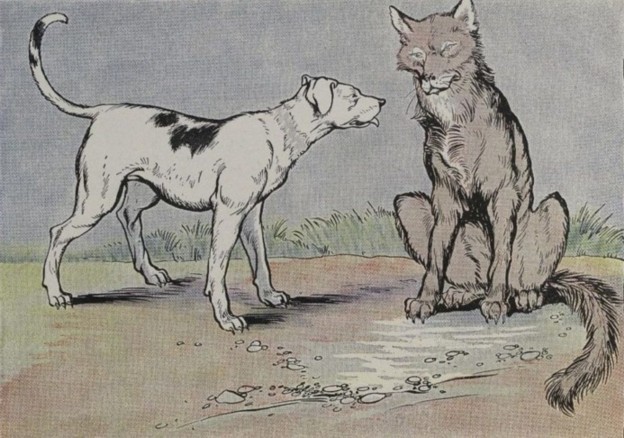| 1. watchful | /WOCH-fuhl/ |
| -paying careful attention and ready to deal with problems | |
| The lifeguard keeps a watchful eye on the swimming children. | |
| 2. wander | /WON-der/ |
| -to walk around slowly in a relaxed way or without any clear purpose or direction | |
| The child wandered from room to room, searching for his missing sock. | |
| 3. compliment | /KOM-pluh-ment/ |
| -a remark that expresses approval, admiration, or respect | |
| The guests were complimenting the chef for the sumptuous food. | |
| 4. chase | /cheys/ |
| -to hurry after someone or something in order to catch him, her, or it | |
| The dog chased the cat up a tree. | |
| 5. chafe | /cheyf/ |
| -to make or become damaged or sore by rubbing | |
| The tight strap chafed the baby’s skin. |

One night this Wolf happened to fall in with a fine fat House Dog who had wandered a little too far from home. The Wolf would gladly have eaten him then and there, but the House Dog looked strong enough to leave his marks should he try it. So the Wolf spoke very humbly to the Dog, complimenting him on his fine appearance.
“You can be as well-fed as I am if you want to,” replied the Dog. “Leave the woods; there you live miserably. Why, you have to fight hard for every bite you get. Follow my example and you will get along beautifully.”
“What must I do?” asked the Wolf.
“Hardly anything,” answered the House Dog. “Chase people who carry canes, bark at beggars, and fawn on the people of the house. In return you will get tidbits of every kind, chicken bones, choice bits of meat, sugar, cake, and much more beside, not to speak of kind words and caresses.”
The Wolf had such a beautiful vision of his coming happiness that he almost wept. But just then he noticed that the hair on the Dog’s neck was worn and the skin was chafed. “What is that on your neck?”
“Nothing at all”, replied the Dog.
“What! Nothing!”
“Oh, just a trifle!”
“But please tell me.”
“Perhaps you see the mark of the collar to which my chain is fastened.”
“What! A chain!” cried the Wolf. “Don’t you go wherever you please?”
“Not always! But what’s the difference?” replied the Dog.
“All the difference in the world! I don’t care a rap for your feasts and I wouldn’t take all the tender young lambs in the world at that price.” And away ran the Wolf to the woods.
There is nothing worth so much as liberty.
| 1. | How does the Wolf look like? How about the House Dog? |
| 2. | What did the Wolf do upon realizing that he could not eat the Dog? |
| 3. | Why was the hair on the Dog’s neck worn and the skin chafed? |
| 1. | Why did the Wolf reject the House Dog’s offer? |
| 2. | If you were in the Wolf’s shoes, would you also do the same? Why? |
| 3. | Would you rather be free but poor or rich with no freedom? Explain your answer. |
| 4. | Do you agree with the lesson in the story? Why or why not? |
| 5. | Have you had an experience similar to the fable’s lesson? Tell me more about it. |
| Grammar 文法 |
Pronunciation 発音 | Vocabulary 単語 |
Comprehension 理解 |
|
|---|---|---|---|---|
 GOOD GOOD |
文法の誤りはほとんどなく、完全な文章で話すことができる | ほとんどの単語をはっきりと正しく発音することができる | 習った表現を適切に使うことができる | 文章を理解し、質問に正しく答えることができる |
 FAIR |
文法の誤りはあるが、完全な文章で話すことができる | 発音の練習が必要な言葉がいくつかある | たまにミスはあるが、習った表現を適切に使うことができる | 文章を完全に理解するのは難しく、質問に正しく答えられないときもある |
 POOR |
文章で話すのは難しく、単語だけで話すことができる | 発音の練習が必要である | 習った単語と表現を少しだけ使うことができる | 文章を理解するのは難しく、質問に答えるのは難しい |
An eBook from The Project Gutenberg.
This eBook is for the use of anyone anywhere at no cost and with almost no restrictions whatsoever. You may copy it, give it away or re-use it under the terms of the Project Gutenberg License included with this eBook or online at www.gutenberg.org